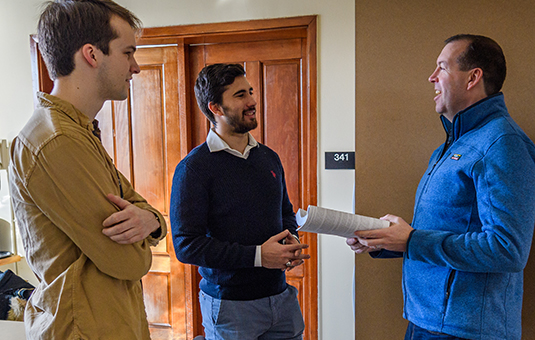Computer Science
Our faculty are connected to the latest trends in computing practices and research. Research interests range from classical and quantum computing to human-computer interaction to assistive technology to artificial intelligence and speech recognition, and so much more.
Submissions from 2009
Simplex-tree based kinematics of foldable objects as multi-body systems involving loops, Li Han and Lee Rudolph
Bending and kissing: Computing self-contact configurations of planar loops with revolute joints, Li Han, Lee Rudolph, Sam Dorsey-Gordon, Dylan Glotzer, Dan Menard, Jon Moran, and James R. Wilson
Submissions from 2008
Uniqueness of Optimal Mod 3 Circuits for Parity, Frederic Green and Amitabha Roy
Stratified deformation space and path planning for a planar closed chain with revolute joints, L. Han, L. Rudolph, J. Blumenthal, and I. Valodzin
Predicting the folding pathway of engrailed homeodomain with a probabilistic roadmap enhanced reaction-path algorithm, Da Wei Li, Haijun Yang, Li Han, and Shuanghong Huo
Convexly stratified deformation spaces and efficient path planning for planar closed chains with revolute joints, Han Li, Rudolph Lee, Jonathon Blumenthal, and Ihar Valodzin
Submissions from 2007
A unified geometric approach for inverse kinematics of a spatial chain with spherical joints, Li Han and Lee Rudolph
Structural and pathway complexity of β-strand reorganization within aggregates of human transthyretin(105-115) peptide, Da Wei Li, Li Han, and Shuanghong Huo
Temperature-dependent probabilistic roadmap algorithm for calculating variationally optimized conformational transition pathways, Haijun Yang, Hao Wu, Dawei Li, Li Han, and Shuanghong Huo
Submissions from 2006
Quantum lower bounds for fanout, M. Fang, S. Fenner, F. Green, S. Homer, and Y. Zhang
Inverse kinematics for a serial chain with joints under distance constraints, Li Han and Lee Rudolph
Submissions from 2005
Bounds on the power of constant-depth quantum circuits, Stephen Fenner, Frederic Green, Steven Homer, and Yong Zhang
Bounds on an exponential sum arising in Boolean circuit complexity, Frederic Green, Amitabha Roy, and Howard Straubing
Submissions from 2004
The correlation between parity and quadratic polynomials mod 3, Frederic Green
Submissions from 2002
Counting, fanout, and the complexity of quantum ACC, Frederic Green, Steven Homer, Cristopher Moore, and Christopher Pollett
Submissions from 2001
Relativized separation of EQP from PNP, Frederic Green and Randall Pruim
Submissions from 2000
A complex-number Fourier technique for lower bounds on the mod-m degree, Frederic Green
On the complexity of quantum ACC, Frederic Green, Steven Homer, and Christopher Pollett
Submissions from 1999
Determining acceptance possibility for a quantum computation is hard for the polynomial hierarchy, Stephen Fenner, Frederic Green, Steven Homer, and Randall Pruim
Exponential sums and circuits with a single threshold gate and mod-gates, F. Green
Submissions from 1997
Coping with Uncertainty in Map Learning, Kenneth Basye, Thomas Dean, and Jeffrey Scott Vitter
Submissions from 1996
On the correlation of symmetric functions, Jin Yi Cai, F. Green, and T. Thierauf
Complements of multivalued functions, Stephen Fenner, Frederic Green, Steven Homer, Alan L. Selman, Thomas Thierauf, and Heribert Vollmer
Submissions from 1995
Learning dynamics: system identification for perceptually challenged agents, Kenneth Basye, Thomas Dean, and Leslie Pack Kaelbling



